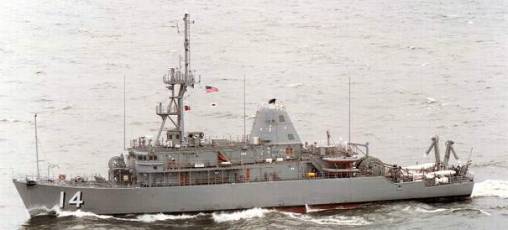The Navy has relieved the commander of a mine-sweeper for having an “unduly familiar relationship” with his female second-in-command. The case, believed to be the first firing of the top two officers on the same ship for fraternizing with one another, is generating a tidal wave of commentary on Navy-related blogs. Some old salts cite it as evidence that women shouldn’t serve aboard naval vessels, while others believe the Navy over-reacted and has lost two talented officers — including a graduate of the U.S. Naval Academy — in which U.S. taxpayers have invested heavily.

The USS Chief
Lt. Cmdr. James Rushton and his executive officer, Lt. Cmdr. Anne Laird, were relieved of duty of the USS Chief, a 225-foot mine countermeasures ship with a crew of 80, now in San Diego. Capt. Robert Hospodar, commodore of Mine Countermeasures Squadron 2, announced Dec. 8 that Rushton “violated the Navy’s fraternization policy by engaging in an unduly familiar relationship with a subordinate female member of his crew,” a Navy spokesman said. Hospodar also fired Laird for “misconduct” after “an investigation into a violation of the Navy’s fraternization policy” by the pair. Such punishment generally signals the end of a Navy career.
“Fraternization” means any relationship in the military chain of command that is prejudicial to good order and discipline. It often, but not always, involves sex. The Navy has declined to detail the case. It’s the 17th ousting of a Navy commanding officer this year, above the average toll of a dozen, but below 2003’s record of 26.
Rushton has posted twice about what happened on a blog restricted to surface warfare officers:
OK folks, since this is all so very public, and so many people here know me well…
I made a terrible error while in Bahrain 11 months ago, and it got out about a month ago.
I’m not bitter with the Navy or my boss…I know and agree with the rules that Commanding Officers must abide by. I did it and I own the consequences.
This is of course incredibly humiliating for me, but my heart breaks for my crew and what they will have to go through. I also feel awful for LCDR Laird, who I considered to be a future Admiral, and has now had all of that talent and promise derailed. She was, and is, one hell of an Officer and person.
I deeply appreciate the many, many calls and emails of support I’ve received…in some ways they hurt more than the cuts.
Sailors have gone to their keyboards to take all sides in the ensuing debate: that the Navy acted unfairly, that the case is evidence that mixed-gender crews don’t work, and that sex must have been — or must not have been — involved. Eventually, Rushton posted again:
I feel compelled to respond to one aspect of this….There was no “hooking up,” as one poster so colorfully put it.
I screwed up quite enough, but it wasn’t that bad…
This will be my last comment, but I can’t let another Officer’s (XO LCDR Laird) reputation be questioned like that and just let it go.
One poster detailed how fraternization can happen without sex:
Department head is constantly going to dinner/lunch/various social functions with two of his officers, but does not invite others. Whenever an invited officer and a non-invited disagree, he sides with the invited one. The invited ones also always fare better on fitreps despite objective markers of performance. This is frat. Another example: a different department head becomes friends with a wardroom spouse. They pt together, are constantly inviting each other over for dinner and the department head often gossips and complains about other members of the wardroom to both the spouse and the officer. Also frat. No sex in either scenario but both led to major morale issues wherein people felt they were at a professional disadvantage because of the personal relationships. It happens. A lot.
One Navy veteran said fraternization at sea is serious. “Frat leads to the perception of special treatment and favoritism, arousing jealousy and rage among those not included,” he wrote. “Rape, murder, or unexplained, unwitnessed persons overboard in the dark are messy and hard to clean up. Talk to a JAG [lawyer] guy in his cups some time.”
Some sailors expressed shock at the charges. “Both Lt. Cdr Rushton and Lt. Cdr Laird were both extraordinary leaders who I entrusted my life in the hands of throughout our arduous deployment to the Arabian Gulf AOR,” one sailor posted. “Many times I would see him strolling the decks at the early morning hours because he took pride in his ship. I’ve first hand saw him roll his sleeves up and get dirty with the rest of us. Lt. Cdr. Laird was the same way. Though having the understanding that officers didn’t need to participate in some ship’s business, like stores-onload, Lt. Cdr. Laird was always the first one on the brow, tossing boxes weighing more than her and showing up some of even the hardest working males on board.”
But that didn’t salve the wounds of those who have witnessed fraternization and the corrosive impact it can have on crews — especially on small ships, like the Chief. “Nothing serves as justification for frat. I have witnessed it firsthand,” one posted. “These fools threw away their careers and painted my Navy with tar.”
One poster who claims to be familiar with the case said most are over-reacting to the charge of fraternization. “The idea that people’s mind go directly to sex and physical involvement rather than the possible close attentive relationship needs to be reviewed as to how this term is used,” the poster noted. “Frankly it’s like planting a big red F on the front of someone’s uniform when it could literally be just a perception with one night of drinking and folks seeing an interaction that led to absolutely nothing. A whole 28-year stellar career [Rushton’s] was tossed out the door because of one human mistake that took less 3 seconds and never happened again.” Added another: “An uninformed and immature ensign reported a false statement, and the product of a rumor mill at work who didn’t like a strong female leader. The Navy lost a great leader today.”
Regardless of this case, posters responding to it on Navy-related blogs said widespread hanky-panky is occurring since women were permitted aboard Navy vessels in 1979. The fact that the Navy has now agreed to assign them to previously all-male submarines — and that openly gay sailors soon may be allowed to serve — has opened the floodgates.
“Not only is it rampant, there even more sailors doing it today that don’t get caught,” wrote an anonymous chief petty officer (the Chief is named for the rank, the most senior of enlisted sailors) who served aboard five vessels before retiring this year. “Here is the Navy’s leadership on this: Fire all those caught fraternizing,” posted retired sailor Bernard Burawski. “What is being done about prevention? Answer: Nothing. All of these firings have given the Navy a black eye, and the hits just keep on coming.”
One group of posters basically said the Navy needs to grow up. “If this had been a male XO, there probably wouldn’t have been any question of fraternization,” another poster says. “Because it was a female, people see them out together on liberty and think there is something going on.”
One officer derided the attitudes of many commenters. “All too often I have seen members of our esteemed wardrooms [where officers gather to eat] go from zero to kindergarten (i.e. Oh my god he talked to a girl! Now they’re getting married!),” he posted. “I really want to move past this sophomoric notion that anytime a man and woman interact it’s some sort of foreplay.”
Navy officers say a commander (CO) and his or her deputy (XO) should have the closest working relationship of any aboard their vessel. The CO runs decisions by the XO before announcing them to their crew, and the XO should be the key person to tell the CO when he or she is getting out of line. “Without more info the relief seems somewhat arbitrary and we fall back on rumor and innuendo,” another poster said. “All of this, of course, begs the larger question of how COs and XOs of different genders will deal with their relationship…something that I doubt that the Navy has provided much guidance on.”
But other commanders, recalling their sea tours, remember the good times they had with their same-sex deputies, spending hours ashore in foreign ports. “I have a hard time thinking about how this could be `unduly familiar’ without proceeding to a step sexual in nature,” one said.
A Naval Academy classmate of Laird’s — she was in the class of 2000 — said she was a “hard charger” who performed well her entire career until a single mistake ruined “two careers and two families” (available evidence indicates both are married, with children).
A minority of posters has praised the Navy’s handling of the case. “No need for speculation,” one said. “Just admiration for thee Navy’s ability to clean house swiftly, when needed.”
Maybe the Pentagon should develop a pill to end such problems, one scientifically-minded commenter said. “Why has there has not been at least DARPA inquiry into creating long-working sexual drive depressants — maybe implants — for the military?” he wrote, referring to the Defense Advanced Research Projects Agency, which invents all kinds of neat things for the military. “Worth some effort, from the pregnancy leaves avoided…to any potential Mata Hari scenarios.”



